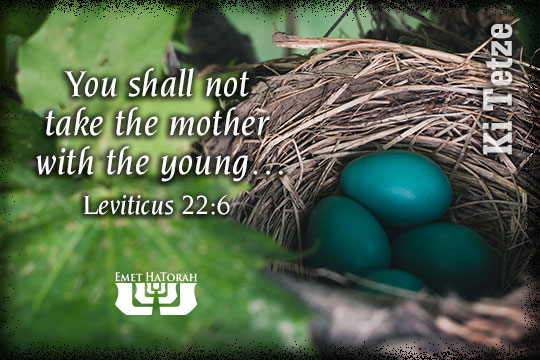Ki Tetze
Series:

The Least of the Commandments
Do not think that I have come to abolish the Law or the Prophets; I have not come to abolish them but to fulfill them. For truly, I say to you, until heaven and earth pass away, not an iota, not a dot, will pass from the Law until all is accomplished. Therefore whoever relaxes one of the least of these commandments and teaches others to do the same will be called least in the kingdom of heaven, but whoever does them and teaches them will be called great in the kingdom of heaven. For I tell you, unless your righteousness exceeds that of the scribes and Pharisees, you will never enter the kingdom of heaven. (Matthew 5:17-20)
What is the “least of the commandments” that Yeshua speaks of in Matthew 5? According to our sages the least commandment is found in this week’s Torah portion:
If you come across a bird's nest in any tree or on the ground, with young ones or eggs and the mother sitting on the young or on the eggs, you shall not take the mother with the young. You shall let the mother go, but the young you may take for yourself, that it may go well with you, and that you may live long. (Deuteronomy 12:6-7)
Sending away the mother bird is considered to be the least or the “lightest” of the commandments. It requires no great effort on the part of the one performing the commandment. It is considered an act of compassion, similar to the commandment in Leviticus that says, “You shall not kill an ox or a sheep and her young in one day” (Leviticus 22:28). Other commandments, however, are more weighty. They require more effort and seem to have more significance than others. For instance, honoring one’s father and mother is considered one of the most weighty or important commandments. But the division between light and heavy commandments is somewhat artificial. Yes, the distinction exists, but they are all to be followed equally. Rabbi Judah explains:
Be as scrupulous about a light commandment as a weighty one, for you do not know the reward allotted for each commandment. (Avot 2:1)
Why does he say this? Because we are told the reward for both a light commandment (the sending away of the mother bird) and a heavy commandment (honoring one’s parents) and the reward for each is the same—long life:
Honor your father and your mother, as the Lord your God commanded you, that your days may be long, and that it may go well with you in the land that the Lord your God is giving you. (Deuteronomy 5:16)
Yeshua agreed with Rabbi Judah that his disciples should observe even the least of the commandments with as much attention as the greatest commandments. He said, “Whoever relaxes one of the least of these commandments and teaches others to do the same will be called least in the kingdom of heaven.” But do we honor his teachings?
Unfortunately, the large majority of Yeshua followers believe that his Father’s instructions—“the Law”—has been abolished, despite this being exactly the opposite of what Yeshua said. Yeshua would never tell his disciples that his Father’s instructions were outdated, had no more relevance or should be abandoned. Therefore, neither should we. Our Heavenly Father is still as compassionate today as He was when the book of Deuteronomy and the commandment to send away the mother bird were written. Why would we think otherwise? After all, His eye is still on the sparrow.








